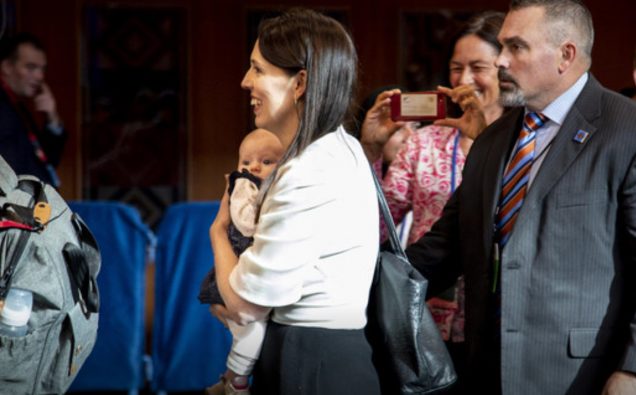
This year’s gathering of world leaders at the United Nations in New York was marked by several “firsts”, distinguishing it from some of the previous annual sessions of the United Nations General Assembly.
New Zealand’s “First Baby”, 3-month-old Neve Te Aroha, made her United Nations debut when her mother — Prime Minister Jacinda Arderna — spoke at the Nelson Mandela peace summit in the General Assembly, shaking up what is still a boys’ club.
It was the first time in the organization’s 73-year history that a woman leader took her newborn into the iconic Assembly hall, making a strong human connection across cultures and political divisions.
It was also the NZ prime minister’s call for multilateralism that inspired hope at a time of exacerbating divisions and frictions.
The high-level segment of 193-member Assembly’s 73rd session was attended by 77 Heads of State, five Vice-Presidents, 44 Heads of Government, four Deputy Prime Ministers, 54 Ministers, and several special envoys.
As the general debate proceeded, Foreign Minister Shah Mahmood Qureshi made history when he delivered Pakistan’s policy statement in Urdu for the first time. Less than an hour before he spoke, the Austrian foreign minister took every one by surprise when she began her maiden speech in Arabic, a first by a western delegate!
The one small difference: While Arabic is an official language of the United Nations — along with English, French, Spanish, Russian and Chinese — Urdu is not.
Iran and India were the only other delegations whose heads — as in the recent past — delivered speeches in their national languages — Persian and Hindi, respectively — which are also not official UN languages.
However, a majority of delegates to the 9-day debate preferred English, an international language of communication widely spoken around the world. According to official statistics, English is spoken in 101 countries, while Arabic in 60, French in 51, Chinese in 33, and Spanish in 31. English has thus gone on to acquire lingua franca status in international business, worldwide diplomacy, and science.
When Austria’s Foreign Minister, Karin Kneiss, strode on the stage in reddish jacket skirt suit and greeted the audience with “marhaba”, loud and sustained applause broke out. One of the reasons for choosing Arabic, she told delegates from around the world, was its status as one of the six official languages of the United Nations.
“I studied Arabic in the UN in Vienna. It is a beautiful language; it is part of the ancient Arab civilization,” Kneissi said. After speaking in fluent Arabic for the first five minute of her 20-minute address, she displayed her language skills by switching to French, Spanish and English.
Dressed in a stylish suit, Foreign Minister Qureshi, a veteran politician and diplomat, spoke in the national language in his usual confident manner and with ease, as it was interpreted into English and other UN languages for the delegates. He addressed the Assembly on the last of a hectic six-day visit to New York during which he had 54 interactions with his counterparts and other delegates, including 22 bilateral and 11 multilateral meetings.
What was remarkable at the Mandela summit was when Ms. Ardern, the New Zealand prime minister, was making her speech, her infant daughter rested quietly on lap of her father, Clark Gayford, a radio and television broadcaster. Said one delegate: She behaved like a “First Baby” — just curiously observing the surroundings! The UN, which follows its procedures religiously, gave the baby a regular UN ID card. After all, how can any one get into the UN building, without an entry pass?
Because everyone on twitter's been asking to see Neve's UN id, staff here whipped one up.
I wish I could have captured the startled look on a Japanese delegation inside UN yesterday who walked into a meeting room in the middle of a nappy change.
Great yarn for her 21st. pic.twitter.com/838BI96VYX— Clarke Gayford (@NZClarke) September 24, 2018
Ardern, 38, gave birth to Neve on 21 June. She became the second prime minister to give birth while in office after Pakistan’s Benazir Bhutto in 1990.
A leader of a rich nation, Prime Minister Arden took a commercial flight to New York at the head of a small delegation. She paid from her own pocket the ticket of her partner, Gayford, and his expenses in New York. She said she made the payment because there were few official spousal engagements Gayford was required to attend, and most of his time was taken up caring for the baby.
Another first: The usually staid world leaders laughed in the General Assembly hall when one of them — US President Donald Trump — boasted about his successes in an exaggerated manner. As leader of the host country, Trump created an awkward and unexpected moment at the start of his speech by saying that his administration “has accomplished more than almost any administration in the history of our country,” an assessment not shared by some world leaders.
“So true,” Trump said as he looked out at the laughing leaders arrayed in front of him. “I didn’t expect that reaction, but that’s OK,” he said evoking more laughter.
Trump later told reporters that he intended to elicit some laughter with his opening lines. “Oh it was great, well, that was meant to get some laughter, so it was great,” he said. The Trump remarks and crowd reaction drew pointed commentary on Twitter, with some ridiculing Trump’s assertion.
The annual gathering of world leaders at UN usually end up without resolving conflicts or problems facing the world, but it at least brings them under one roof and an opportunity to get to know each other. Promoting communications between nations is one of the world body’s major objectives.

















